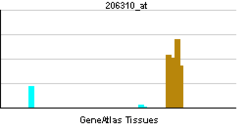SPINK2
Serine protease inhibitor Kazal-type 2 also known as acrosin-trypsin inhibitor is a protein that in humans is encoded by the SPINK2 gene.[2][3]
See also
References
[1]
Further reading
- Wapenaar MC, Monsuur AJ, Poell J, et al. (2007). "The SPINK gene family and celiac disease susceptibility.". Immunogenetics. 59 (5): 349–57. doi:10.1007/s00251-007-0199-5. PMC 1914236
 . PMID 17333166.
. PMID 17333166.
- Gerhard DS, Wagner L, Feingold EA, et al. (2004). "The status, quality, and expansion of the NIH full-length cDNA project: the Mammalian Gene Collection (MGC).". Genome Res. 14 (10B): 2121–7. doi:10.1101/gr.2596504. PMC 528928
 . PMID 15489334.
. PMID 15489334.
- Rockett JC, Patrizio P, Schmid JE, et al. (2004). "Gene expression patterns associated with infertility in humans and rodent models.". Mutat. Res. 549 (1-2): 225–40. doi:10.1016/j.mrfmmm.2003.11.017. PMID 15120973.
- Strausberg RL, Feingold EA, Grouse LH, et al. (2003). "Generation and initial analysis of more than 15,000 full-length human and mouse cDNA sequences.". Proc. Natl. Acad. Sci. U.S.A. 99 (26): 16899–903. doi:10.1073/pnas.242603899. PMC 139241
 . PMID 12477932.
. PMID 12477932.
- Fink E, Hehlein-Fink C, Eulitz M (1990). "Amino acid sequence elucidation of human acrosin-trypsin inhibitor (HUSI-II) reveals that Kazal-type proteinase inhibitors are structurally related to beta-subunits of glycoprotein hormones.". FEBS Lett. 270 (1-2): 222–4. doi:10.1016/0014-5793(90)81273-Q. PMID 2226783.
- Collins J, Taube W, Fink E, et al. (1992). "Variants of human seminal acrosin inhibitor (HUSI-II) which inhibit human leukocyte elastase.". Biomed. Biochim. Acta. 50 (4-6): 683–5. PMID 1801743.
- Möritz A, Lilja H, Fink E (1991). "Molecular cloning and sequence analysis of the cDNA encoding the human acrosin-trypsin inhibitor (HUSI-II).". FEBS Lett. 278 (1): 127–30. doi:10.1016/0014-5793(91)80099-O. PMID 1704312.
- Dietl T, Kruck J, Schill WB, Fritz H (1977). "Localization of seminal plasma proteinase inhibitors in human spermatozoa as revealed by the indirect immunofluorescence technique.". Hoppe-Seyler's Z. Physiol. Chem. 357 (10): 1333–7. doi:10.1515/bchm2.1976.357.2.1333. PMID 791787.
- ↑ Lee B, Park I, Jin S, Choi H, Kwon JT, Kim J, Jeong J, Cho BN, Eddy EM, Cho C (2011). "Impaired spermatogenesis and fertility in mice carrying a mutation in the Spink2 gene expressed predominantly in testes". J. Biol. Chem. 286: 29108–17. doi:10.1074/jbc.M111.244905. PMC 3190718
 . PMID 21705336.
. PMID 21705336.

 . PMID 17333166.
. PMID 17333166. . PMID 15489334.
. PMID 15489334. . PMID 12477932.
. PMID 12477932. . PMID 21705336.
. PMID 21705336.